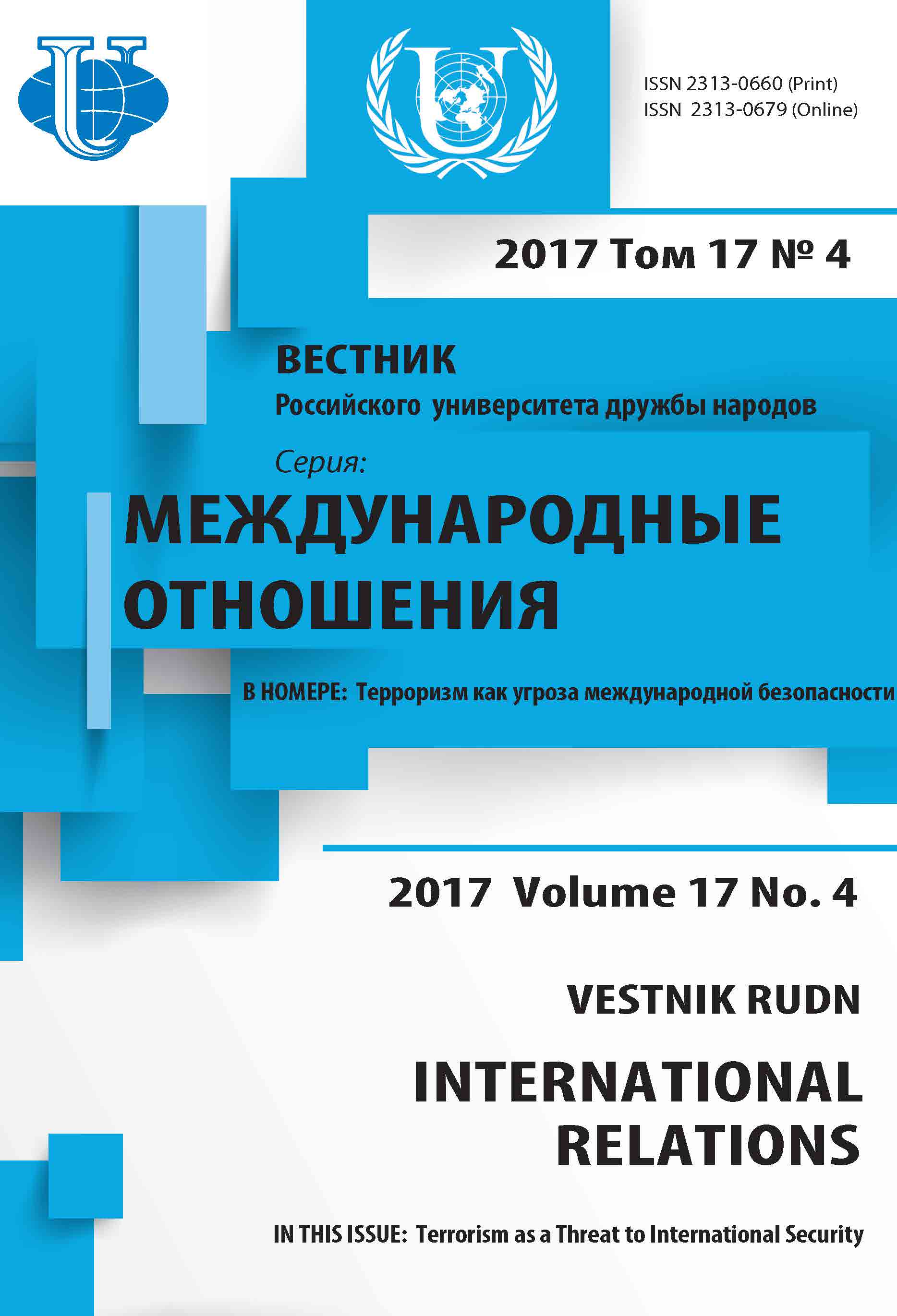GERMANY G20 PRESIDENCY. THE TEST BY TRUMP
- 作者: Larionova MV1
-
隶属关系:
- Russian Presidential Academy of National Economy and Public Administration
- 期: 卷 17, 编号 4 (2017): Terrorism as a threat to international security
- 页面: 807-823
- 栏目: 国际经济关系
- URL: https://journals.rudn.ru/international-relations/article/view/17538
- DOI: https://doi.org/10.22363/2313-0660-2017-17-4-807-823
如何引用文章
全文:
详细
For almost ten years the G20 brings together the leaders of advanced countries and countries with emerging economy to govern shared challenges. Assessments of its role range from a very skeptical to a highly positive judgement. Nevertheless, the G20 remains a key forum for economic cooperation in the face of shifting values and powers, rising protectionism, environmental depletion and increasing anti-globalization. Each presidency is unique in its search for a balance between national priorities and partners’ interests in the process of charting agenda and forging collective decisions. High expectations of Ger-man G20 presidency were defined by internal and external factors. First, the demand for a response to the increasing challenges of de-globalization, economic inequality and climate change. Second, Germany’s unique potential to enhance G20 effectiveness and consolidate the forum’s role as a global public good sponsor due to the country’s economic power and diplomatic influence. The article reviews German G20 presidency priorities and outcomes in the context of internal and external challenges: the US 45th President’s position on international trade and climate, Brexit negotia-tions, national September parliamentary elections in Germany, the country’s significant and persistent current account surplus. The author claims that G20 has made substantial progress under German presi-dency. Geopolitical problems did not prevent the leaders from crafting decisions on key economic agenda issues. Six ministerial meetings were concluded by adoption of declarations, cooperation on digital economy and health was institutionalized, the leaders agreed 15 documents, including the Declaration and Action Plan on Countering Terrorism, and made more than 500 commitments. The summit hosted around 70 bilateral leaders’ meetings. Thus, despite divergences and tensions between G20 members, internal and external challenges, G20 laid the foundation for future agenda on the presidency priorities of digital economy, health and migration; advanced cooperation on core policy areas; agreed statements which allow to surmount pro-tectionist trends in international trade; consolidated G20 commitment to the Paris agreement implemen-tation; strengthened cooperation on energy sustainability and efficiency. To sum up G20 demonstrated resilience to new tests and confirmed its role as a key forum for economic cooperation.
作者简介
M Larionova
Russian Presidential Academy of National Economy and Public Administration
编辑信件的主要联系方式.
Email: larionova-mv@ranepa.ru
Larionova Marina Vladimirovna - Doctor of Political Science, Head of the Center for International Institutions Research of Russian Presidential Academy of National Economy and Public Administration, Professor of the Department of World Economy of the Faculty of World Economy and World Politics of the HSE
参考
- Berger, A. (2017). What remains of the G20 Hamburg Summit? URL: https://www.die-gdi.de/ uploads/media/German_Development_Institute_Berger_10.07.2017.pdf (accessed: 13.08.2017).
- Bown, C. (2017). 17—21 Steel, Aluminum, Lumber, Solar: Trump’s Stealth Trade Protection. Peterson Institute for International Economics Policy Brief. URL: https://piie.com/system/ files/documents/pb17-21.pdf (accessed: 13.08.2017).
- Burri, M. & Cottier, T. (2015). Trade Governance in the Digital Age. Cambridge University Press.
- Cooper, A. (2014). The G20 and Contested Global Governance: BRICS, Middle Powers and Small States. Caribbean Journal of International Relations & Diplomacy, 2 (3), 87—109.
- Fues, T. (2017). Recalibrating the G20’s Mission towards Sustainable Development: Opportunities and Challenges for the German Presidency. International Organisations Research Journal (IORJ), 12 (2) (forthcoming). (in Russ.).
- Irwin, D. (2017). The False Promise of Protectionism. Why Trump’s Trade Policy Could Backfire. Foreign Affairs. URL: https://www.foreignaffairs.com/articles/united-states/2017-04-17/falsepromise-protectionism (accessed: 13.08.2017).
- James, H. (2017). Deglobalization as a Global Challenge. CIGI Papers No. 135. URL: https://www.cigionline.org/sites/default/files/documents/Paper%20no.135WEB_1.pdf (accessed: 13.08.2017).
- Kirton, J. (2013). G20 Governance for a Globalized World. Farnham: Ashgate.
- Kirton, J. (2017). A Summit of Solid Success at Hamburg in 2017. URL: http://www.g20.utoronto.ca/ analysis/170708-kirton-success.html (accessed: 13.08.2017).
- Larionova, M.V. (2012). Supply-Demand Model for Developing a Presidency Proposals for Reform Agenda and Priorities in Informal International Institutions (G20, G8, BRICS). International Organisations Research Journal (IORJ), 7 (4), 7—17. (in Russ.).
- Larionova, M.V. Sakharov, A.G., Shelepov, A.V. & Rakhmangulov, M.R. (2017). Donald Trump’s Foreign Policy and Multilateral Institutions of Collective Governance. Russian Economic Developments, 24 (4), 31—41. (in Russ.).
- OECD (2017). Key Issues for Digital Transformation in the G20. Report prepared for a joint G20 German Presidency. OECD conference. Berlin, 12 January. URL: https://www.oecd.org/g20/ key-issues-for-digital-transformation-in-the-g20.pdf (accessed: 13.08.2017).
- Shelepov, A.V. (2016). Action Plan: Global Tax Cooperation. International Organisations Research Journal (IORJ), 11 (4), 36—59. (in Russ.).








